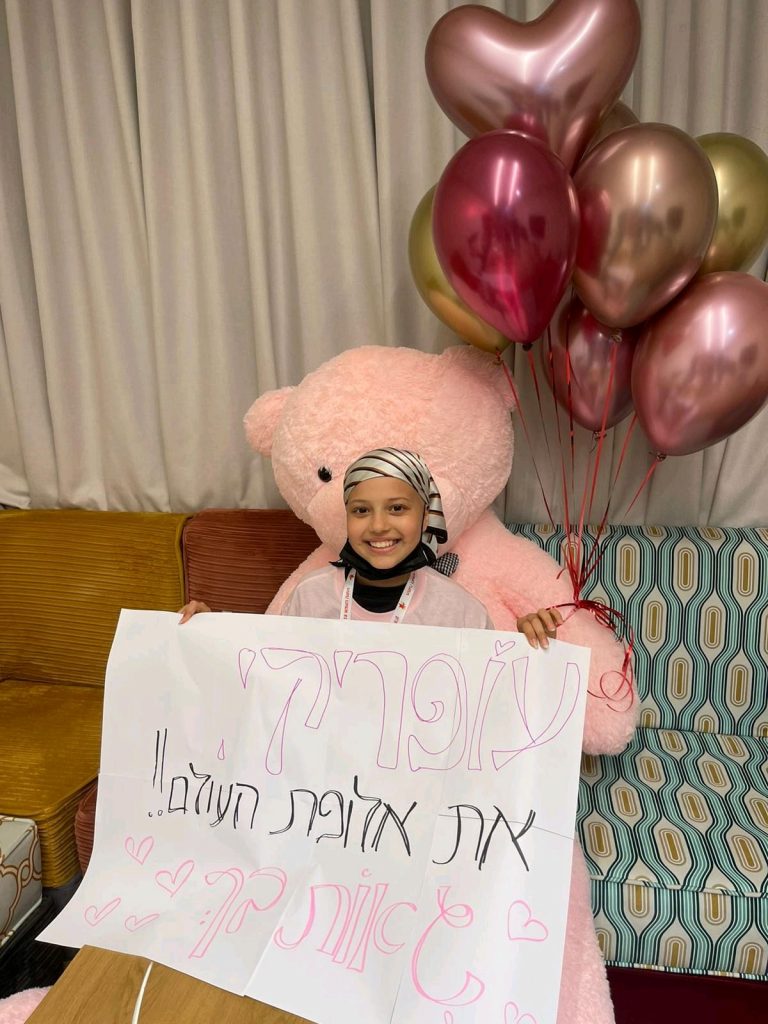
Deeply ingrained in the Ezer Mizion volunteer is to ‘be there’ both practically and in spirit with the needs of those suffering from life’s crises. It may be sharing tears when the prognosis is not good or it may be sharing smiles at a festive party like that which took place recently with Ofri who celebrated her last treatment, Note her grin. Doesn’t it say it all!
Sometimes it’s completely spontaneous, unplanned, as if a Higher Hand brought her to this place at this time. Like Hinda. HInda and her husband Chaim, having had corona, wanted to make a difference in the lives of others. They volunteered to help out in the corona ward of Hadassah Ein Kerem. Not an easy undertaking. It involved working in clumsy, stifling PPE gear but they were needed and that was enough for them. The extremely overworked nurses had no time or stamina for the little extras – the drink of cold water, the warm embrace, the encouraging word, dialing a number to reach a family member. And that is where we find Hinda on that fateful day. She stops to say a chapter of Psalsm at the bedside of an intubated patient and, for some reason unknown to her, returns to the room after she had left. An automatic glance at the monitor. A scream. She rushes to the nurses’ station but is told that there are no relatives to inform. She gathers a group and begins to say vidui (final prayers) at the patient’s bedside. Fifteen minutes later, no longer needed, she blindly makes her way toward the hospital entrance where Chaim is waiting for her. With tears still streaming down her face, she shares the recent scenario with Chaim. As Hinda reaches the end of her story, an announcement is heard over the loudspeaker: Meis Mitzvah! Meis Mitzvah! (an opportunity to accompany a deceased person when no relatives exist) Levaya (funeral) of man who died with no relatives. Chaim notices the announcement coming onto his phone with a picture. ‘Is this the man?’ he asks. Hinda glances down and nods, too shocked to speak. They had just stopped at the flower shop to buy flowers for Shabbos. Right there, several doors down, is the funeral chapel. The levaya is called for 3:00. Simultaneously, they look at their watches. Three P.M. As if on stage, as part of a play, they follow their cue. The funeral of this meis mitzvah is attended by two people. Two people who fulfilled their roles created by the Master Playwright. As the play draws to a close, Chaim undertakes to complete the mitzvah by becoming the niftar’s ‘ (deveased person’s) kaddishel’ (one to say the mourners prayer) for the year. The play reaches its grand finale when Hinda is informed that during the tahara (purification of the body prior to burial) , a member of the chevra kaddisha (those that do the purification) bent down and whispered into the ear of the niftar (deceased) : a koshera Yiddishe veib haht gezogt vidui bei eich. (You merited that a religious woman said the final prayers with you.)
Ezer Mizion volunteers…there for you for whatever is needed.
